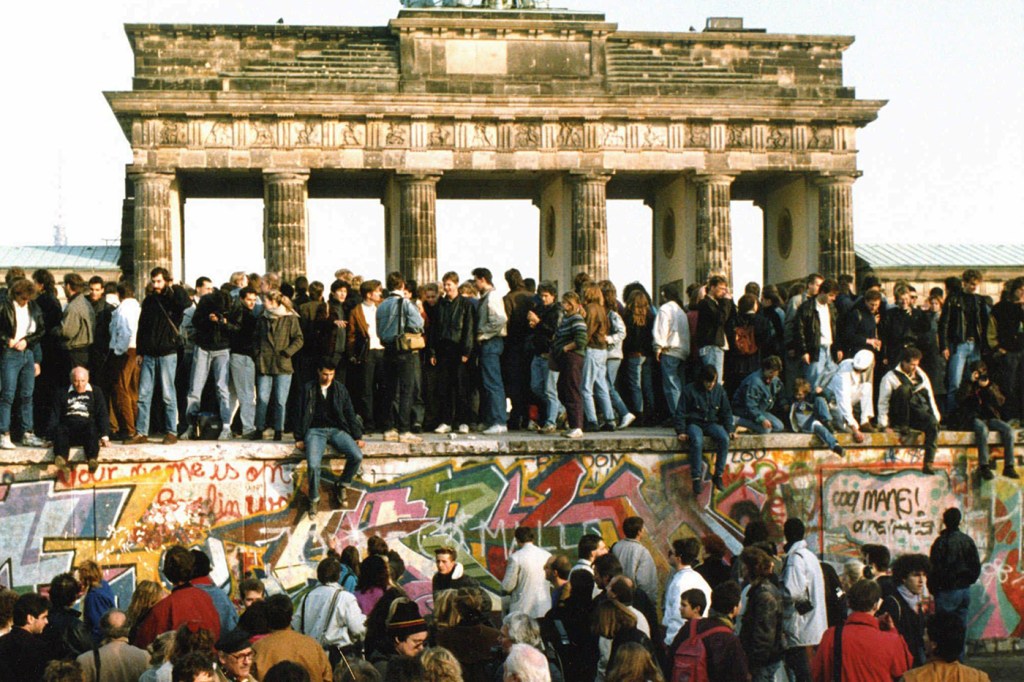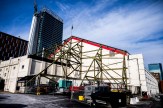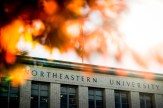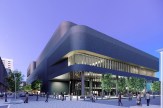30 years ago the Berlin Wall fell. And then Prague happened.

Thirty years ago, the Berlin Wall fell. It was an extraordinary moment in history: The wall had come to represent the global East/West divide during the Cold War, and its toppling a symbol of the victory of Western democracy over Soviet-style communism.

Jonathan Kaufman is director of the School of Journalism in the College of Arts, Media and Design at Northeastern. Matthew Modoono/Northeastern
Jonathan Kaufman, who is the director of Northeastern’s School of Journalism, was a reporter at The Boston Globe in 1989, and was dispatched to cover the political upheaval that was spreading across Eastern Europe.
He recalls the culture shock that seemed to grip East Germans entering West Germany for the first time, and a protest in Prague that led to the dissolution of communism there, too—signaling the pro-democracy domino effect that was to change Eastern Europe in a matter of weeks.
“No one could have predicted what would happen during those six weeks,” he said. “It was an astonishing thing to see the collapse of communism in Eastern Europe.”
What was the atmosphere like in Berlin after the wall fell?
I was in Boston when word came through that the wall fell. My foreign editor came around and said, ‘Get on a plane, you’re going to Berlin,’ and I arrived the day after the wall fell.
I didn’t sleep for two days. We [Kaufman and other reporters] were just watching this remarkable sight of East Germans pouring across the wall. And in Berlin, in front of every shop, these crowds of East Germans were gathered. They would hover in front of the shop windows, kind of in awe of the amount of food and technology available in West Berlin. They were finally able to understand what the West was like, and what communism had done [in East Germany].
Pretty soon I got another call from my foreign editor, telling me to go to Prague, because everyone had a sense that that’s where something might happen next.
I arrived on a Tuesday, and reporters from all over were arriving, too. Things seemed pretty complacent there, though, and on Thursday we were all filing our Sunday stories that said as much.
The Czech Communist Party had arranged a regular march on Thursday, and it seemed to be a pretty standard affair—a bunch of students marching down the street with communist signs, chanting communist slogans. Then suddenly, the crowd stopped and turned left toward the center of the city, chanting pro-democracy slogans.
We all thought, ‘This is it, it’s happening, the revolution has spread to Prague.’
Police set up a barricade that blocked the protesters from getting into the city square, and while everyone was stopped, we reporters made our way up to the front of the crowd, so we were between the crowd and the police. And we just sort of stood there and watched what happened.
One of the most haunting moments I can remember came next: All the students started singing. And none of us spoke Czech, but pretty soon I recognized the melody, and realized they were singing “We Shall Overcome.”
The standoff continued for a while, and then suddenly the police charged. I had my hands over my head. Someone hit me with a truncheon and dented my wedding ring.
At that point, we had to race back to our hotels, call our [news]desks, and tell them to kill the stories we had just filed. The revolution was spreading.
And within 10 days, the communist government had collapsed.
Though the Berlin Wall is gone, Germany is still deeply divided. Were there any clues that this might be the case, 30 years ago?
The Berlin Wall fell, but people still had a wall in their heads.
I remember calling my wife after getting to Berlin and telling her: The honeymoon [between East- and West Germans] is over. When you would talk to West Germans, they were already complaining about the East Germans.
The East Germans resented the way West Germans treated them—sort of condescending—and West Germans resented the fact that they had to spend billions of dollars to, essentially, bring East Germany up to West German standards.
What we saw was that a lot of these communist countries had been in a deep freeze since World War II. Once communism started to collapse, it was sort of like bad meat thawing out. You saw the return of many of the old ethnic hatreds of Eastern Europe.
But, we predicted 30 years ago that the children would probably do better than their parents, and that’s true now. These old divides just aren’t as prevalent in the younger generations.
What did you learn from your experience?
History surprises us all the time. No one could have predicted what would happen during those six weeks; it was an astonishing thing to see the collapse of communism in Eastern Europe.
Looking back, we were probably too optimistic about what would follow, but I think it’s important to have some perspective—even with this sort of nationalist, populist trend we see now, nobody today would want to go back to the way the world was before 1989.
To me, that’s why hearing “We Shall Overcome” was so moving: These were students fighting for democracy, using a song made popular during the U.S. civil rights movement decades earlier, in a country thousands of miles away.
In November 1989, people were taking to the streets all over Eastern Europe demanding democracy, and they won.
History, and people, often surprise you.
For media inquiries, please contact Shannon Nargi at s.nargi@northeastern.edu or 617-373-5718.





